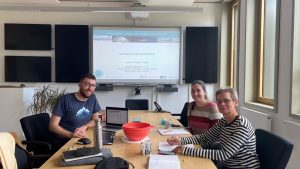IRTG Travel Grants Programme
PhD candidate Benjamin Kirbus went for a scientific exchange meeting to the AWI Potsdam colleagues
On 15th September 2022, I was able to embark on very constructive one-day journey to visit Dr. Annette Rinke and PhD candidate Sofie Tiedeck at AWI Potsdam. The institute is beautifully located on a historical campus, within a green forest patch not too far from Potsdam main station. The general topics of our meeting were opportunitues and challenges of Lagrangian air mass tracking.
First, we had some very fruitful technical discussions on using the LAGRangian ANalysis TOol LAGRANTO (https://doi.org/10.5194/gmd-8-2569-2015). LAGRANTO can be driven by very diverse input data, such as reanalysis (ERA5) or model data (ICON). Selecting the appropriate starting points for trajectory calculations is far from trivial, especially for analyzing synoptic-scale features such as Arctic Warm Air Intrusions (WAI). The spatiotemporal variability of such WAI combined with possible strong vertical wind shear can cause a large spread in computed trajectories. We agreed on the importance of comparing different starting points as well as ideally forward vs. backward calculations. Tracing meteorological variables as well as analyzing height-resolved curtain views of along-trajectory air mass evolution (“pseudo-lidar”) can then deliver many novel insights.
Our second focus was the discussion of the article we are cooperating on in the frameworks of Cross-Cutting Activity CCA4: Air mass transport and transformation. We hope to contribute to the research field by providing some novel insights into Arctic WAI. This work is based on a case recorded during the MOSAiC expedition in April 2020 at RV Polarstern. We agreed on combining classic Eulerian with novel Lagrangian viewpoints, on spatial scales from the synoptic level down to process level. We discussed how sensitivity studies can help us better understand the impact e.g. of CCN concentration or initial moisture inflow on cloud evolution.
All in all, I thoroughly enjoyed my stay at AWI Potsdam. Besides the great hospitality of Annette, Sofie and other AWI colleagues, I gained more insights into applying LAGRANTO
also for other datasets than just reanalysis. Especially the potential of comparing trajectories between modelled control and experimental runs became very apparent. Furthermore, we were able to further “narrow down” the storyline of our common CCA4 paper, which now will have a clearer scope and objectives.
Finally, I want to cordially thank both Annette and Sofie for their time and the IRTG for funding this very productive short-term stay.
Cheers, Benjamin
A list of all funded travel grants can be found on the IRTG page here.

